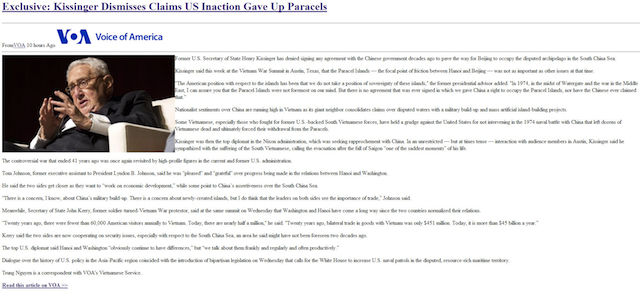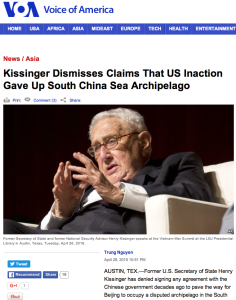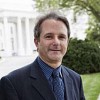BBG Watch OPINION
When Exclusive is not Exclusive
By Dan Robinson
A headline on a story appearing recently on the VOA English website caught my eye. Why? Because it was designed to.
Exclusive! the headline screamed . . . in introducing a story about Henry Kissinger and other former secretaries of state appearing at the Vietnam War Summit at the LBJ Presidential Library in Austin, Texas.
That’s right . . . read all about it! Exclusive! Right here at VOA! You won’t be able to see this report anywhere else.
The problem was — it wasn’t true.
Reading through the item, it was immediately apparent — to a trained journalistic eye — why the headline was a lie.
The story contained not a single paragraph demonstrating any exclusivity. There was no interview by the author of the piece, with Kissinger himself.
VOA had more than one reporter at the event. In addition to the Austin dateline story by Trung Nguyen, a separate version by VOA correspondent Greg Flakus focused on the broader ongoing debate over the Vietnam war.

Amazingly, the story with the false claim of exclusivity also appeared on VOA’s main English website, until it was changed at some point. It was also published by other global websites that use VOA material (see photos below). And, of course, the EXCLUSIVE claim by VOA lives on courtesy of Twitter.

When a news report put out by any outlet — print/online or broadcast — claims exclusivity it means that the writer and the outlet are asserting that the end user is not likely to get this information anywhere else.
For the heck of it, I did an online search for articles commenting about the term exclusive.
One result reads: “Find a way of claiming to be unique and superior in some way from your competitors. Indicate that the only way to gain these special benefits that only you can offer is by buying your products. . .by offering something that is unique, you are letting the target customer share in that uniqueness and thus stand out as someone special and to feel that others will envy and admire them.”
My search also turned up one of the more effective attempts in recent years, by The Huffington Post, to take down journalists who overuse the term exclusive.
To quote from this excellent article: “Exclusive: Possibly the most misused word in journalism, and one that should be used only when an interview subject submits to questioning by your news organization and no other, often on specific topic (Lance Armstrong’s chat with Oprah qualifies as an exclusive). The Oxford English Dictionary defines ‘exclusive’ as something “in which others have no share, esp. of journalistic news or other published matter.”
Back to the VOA story and the reason this is kind of a big deal that should be a teachable moment.
The impulses behind the initial use of the term exclusive are pretty clear. The VOA Vietnamese reporter focused on the specific angle of Kissinger’s denial that he signed any agreement with China decades ago to allow Beijing to occupy the Paracel Islands.
 We do not know who attached the “exclusive” term to the headline before it was removed. Using the word exclusive drew attention to that particular aspect of the event. Someone at the Voice of America may have seen this as a way of promoting VOA’s Vietnamese Service, which competes with other sites using that language.
We do not know who attached the “exclusive” term to the headline before it was removed. Using the word exclusive drew attention to that particular aspect of the event. Someone at the Voice of America may have seen this as a way of promoting VOA’s Vietnamese Service, which competes with other sites using that language.
Journalistically, it was flat out wrong. Someone finally noticed, and the headline was changed (see photo) to read: “Kissinger Dismisses Claims US Inaction Gave Up Paracels”
The reason this is important goes back to something noted in the past regarding VOA language services, who I have suggested often seem to be in the business of “desperately seeking attention” for themselves.
Some language services have a tendency to claim exclusivity, or headline stories (or Twitter alerts) in a way to be seen as being ahead of competitors, as part of their effort to impress bosses in the Cohen Building.
In 2015, I observed that it remained to be seen whether top officials, including the BBG CEO (at the time it was Andy Lack) and others would recognize and address a series of news failures, deceptive website tactics, pandering and self-promotion at VOA.
VOA’s new director, Amanda Bennett, is in her early days in the organization. She is beginning a long process in which she will learn about a bureaucracy (and sub-bureaucracies) that have decades of experience protecting themselves from external criticism.
In her first remarks to staff, she spoke of what she called the “fantastic leadership team.”
More than likely, Bennett would never learn about numerous issues, such as this journalistically inaccurate headline, directly from VOA’s “fantastic” newsroom leadership. They will be covered up before they even get to her level.
One way of dealing with this would be to implement a suggestion I made to establish a journalistic Ombudsman position to, as I wrote at the time, “. . .finally join [other] news organizations and demonstrate a commitment to focusing on assessing its own journalistic and coverage issues.”
Without this tool, VOA (with Bennett at the helm) will stumble along day to day with additional glaring mistakes of the kind this example demonstrates, looking foolish to those on the outside who do notice them.
ALSO READ: OPINION – DAN ROBINSON – One Year Later — Dysfunction, News Failures, Self-Promotion and Pandering at the Voice of America, BBG Watch, February 17, 2015
ALSO SEE: VOA journalists: ‘BBG, Please Save Voice of America’ – ALL RECOMMENDATIONS I THRU VII, BBG Watch, February 24, 2014.
 Dan Robinson retired in 2014 after 34 years with the Voice of America. In addition to his White House posting as senior VOA correspondent, he served as bureau chief in Nairobi, Kenya and Bangkok, Thailand. He was also the chief of the VOA Burmese Service and the Capitol Hill correspondent.
Dan Robinson retired in 2014 after 34 years with the Voice of America. In addition to his White House posting as senior VOA correspondent, he served as bureau chief in Nairobi, Kenya and Bangkok, Thailand. He was also the chief of the VOA Burmese Service and the Capitol Hill correspondent.

